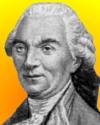 (source)
(source)
|
Comte Georges-Louis Leclerc de Buffon
(7 Sep 1707 - 16 Apr 1788)
French naturalist who formulated a crude theory of evolution and was the first to suggest that the earth might be older than suggested by the Bible. He proposed that the Earth was hot at its creation.
|
Comte Georges-Louis Leclerc de Buffon Quotes on Observation (6 quotes)
>> Click for 30 Science Quotes by Comte Georges-Louis Leclerc de Buffon
>> Click for Comte Georges-Louis Leclerc de Buffon Quotes on | Nature |
>> Click for 30 Science Quotes by Comte Georges-Louis Leclerc de Buffon
>> Click for Comte Georges-Louis Leclerc de Buffon Quotes on | Nature |
Rassemblons des faits pour nous donner des idées.
Let us gather facts in order to get ourselves thinking.
Let us gather facts in order to get ourselves thinking.
— Comte Georges-Louis Leclerc de Buffon
'Histoire des Animaux', Histoire Naturelle, Générale et Particulière, avec la Description du Cabinet du Roi (1749), Vol. 2, 18. Quoted in Jacques Roger, The Life Sciences in Eighteenth- Century French Thought, ed. Keith R. Benson and trans. Robert Ellrich (1997), 440.
As historians, we refuse to allow ourselves these vain speculations which turn on possibilities that, in order to be reduced to actuality, suppose an overturning of the Universe, in which our globe, like a speck of abandoned matter, escapes our vision and is no longer an object worthy of our regard. In order to fix our vision, it is necessary to take it such as it is, to observe well all parts of it, and by indications infer from the present to the past.
— Comte Georges-Louis Leclerc de Buffon
'Second Discours: Histoire et Theorie de la Terre', Histoire Naturelle, Ginerale et Particulière, Avec la Description du Cabinet du Roi (1749), Vol. 1, 98-9. Trans. Phillip R. Sloan.
Far from becoming discouraged, the philosopher should applaud nature, even when she appears miserly of herself or overly mysterious, and should feel pleased that as he lifts one part of her veil, she allows him to glimpse an immense number of other objects, all worthy of investigation. For what we already know should allow us to judge of what we will be able to know; the human mind has no frontiers, it extends proportionately as the universe displays itself; man, then, can and must attempt all, and he needs only time in order to know all. By multiplying his observations, he could even see and foresee all phenomena, all of nature's occurrences, with as much truth and certainty as if he were deducing them directly from causes. And what more excusable or even more noble enthusiasm could there be than that of believing man capable of recognizing all the powers, and discovering through his investigations all the secrets, of nature!
— Comte Georges-Louis Leclerc de Buffon
'Des Mulets', Oeuvres Philosophiques, ed. Jean Piveteau (1954), 414. Quoted in Jacques Roger, The Life Sciences in Eighteenth-Century French Thought, ed. Keith R. Benson and trans. Robert Ellrich (1997), 458.
For deciding what has occurred and even what will occur, we have only to examine what is occurring.
— Comte Georges-Louis Leclerc de Buffon
In Theory of the Earth, from the original French, “Pour juger de ce qui est arrivé, et même de ce qui arrivera, nous n’avons qu’à examiner ce qui arrive.” Collected in Théorie de la Terre (1749), collected in Oeuvres Complètes de Buffon (1837), 42. As quoted and translated in Reijer Hooykaas, Selected Studies in History of Science (1983), 513.
o2BGAAAAYAAJ - Translate this page
Georges Louis Leclerc comte de Buffon - 1837
For the little that one has reflected on the origin of our knowledge, it is easy to perceive that we can acquire it only by means of comparison. That which is absolutely incomparable is wholly incomprehensible. God is the only example that we could give here. He cannot be comprehended, because he cannot be compared. But all which is susceptible of comparison, everything that we can perceive by different aspects, all that we can consider relatively, can always be judged according to our knowledge.
— Comte Georges-Louis Leclerc de Buffon
'Histoire naturelle de l'Homme', Histoire Naturelle, Générale et Particulière, Avec la Description du Cabinet du Roi (1749), Vol. 2, 431. Trans. Phillip R. Sloan.
I am convinced, by repeated observation, that marbles, lime-stones, chalks, marls, clays, sand, and almost all terrestrial substances, wherever situated, are full of shells and other spoils of the ocean.
— Comte Georges-Louis Leclerc de Buffon
'Second Discours: Histoire & Théorie de la Terre', Histoire Naturelle, Générale et Particulière, Avec la Description du Cabinet du Roi (1749), Vol. I, 76-77; Natural History, General and Particular (1785), Vol. I, trans. W. Smellie, 13.
See also:
- 7 Sep - short biography, births, deaths and events on date of Buffon's birth.

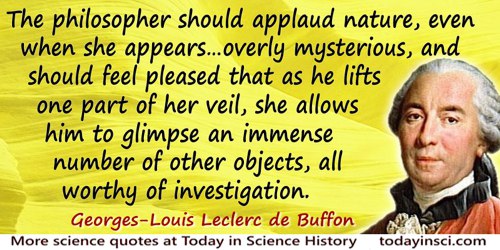
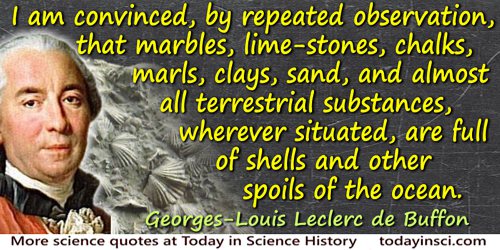

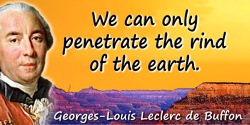
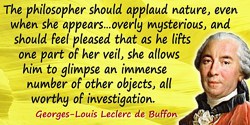
 In science it often happens that scientists say, 'You know that's a really good argument; my position is mistaken,' and then they would actually change their minds and you never hear that old view from them again. They really do it. It doesn't happen as often as it should, because scientists are human and change is sometimes painful. But it happens every day. I cannot recall the last time something like that happened in politics or religion.
(1987) --
In science it often happens that scientists say, 'You know that's a really good argument; my position is mistaken,' and then they would actually change their minds and you never hear that old view from them again. They really do it. It doesn't happen as often as it should, because scientists are human and change is sometimes painful. But it happens every day. I cannot recall the last time something like that happened in politics or religion.
(1987) -- 


